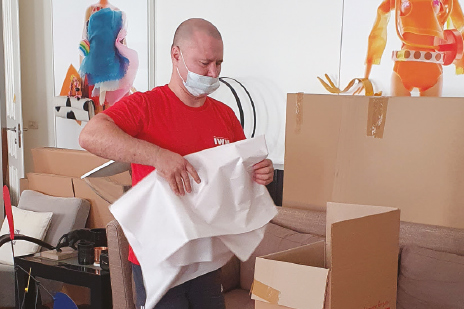The Russian business boom of the 1990s gave IWM a strong start, but market changes and challenges since have demanded skill and stamina from the ambitious mover to keep on going. Victoria Chub, Managing Director of IWM – which has affiliated offices in St Petersburg, Moscow and Yuhzno-Sakhalinsk – talks to FIDI Focus about the journey so far
FF: What are the characteristics of the Russian moving market?
Victoria Chub (VC): The Russian moving market is young compared with the European or US markets. Moving and relocation services – in the way we understand them today – started in the mid-1990s, when international corporations began to be welcomed to the Russian market.
IWM began full operations in Moscow in 1996, with a few contracts. By the end of 1997, beginning of 1998, the moving industry had started to boom because of the big multinationals who were beginning operations in Russia and needed to move managers to the country to set up businesses that were compliant with their values, corporate culture and knowledge.
FF: How has the Russian moving industry evolved over the past 10 years?
VC: The turnover for the international moving business started to slow down for several reasons:
Since July 2010, the import of household goods and personal effects is not duty free. The amount – €4 per kg – is substantial, and multinationals have reviewed their relocation policies and squeezed their allowances. By 2012, our data showed that the number of moves into Russia of more than 30m3 dropped to 30 per cent;
More and more Russian specialists and managers started to replace expats, and this is still an ongoing trend. It is much more cost-effective to employ local managers than to bring an expat and their family into the market. Today, there is a trend for Russian managers moving from Russia to other countries, instead of foreigners relocating to our market;
Sanctions against Russia decreased the number of initiations in/out of the country, because many international projects were frozen for an indefinite period;
The Russian domestic moving market has developed incredibly fast, which provides interesting new opportunities for moving business development within different regions of the country. This gives more security during a period of international lockdowns, when such business is at ‘ground zero’. Looking at our fellow companies, we have seen that when movers have relied solely on international business, and didn’t develop or invest in domestic opportunities, there is a high chance of them disappearing from the Russian market.
FF: What impact has COVID-19 had on moving in the country?
VC: We believe the impact is the same for us as for the others: during the first wave, all international business for us disappeared, with a little warming up during the summer and autumn, followed by a great boom during November and December.
However, because of our strong domestic presence, we survived mainly because of our local contracts with big accounts, who were still doing a lot of movements and office relocation projects. Our international team were ‘employed’ by the domestic team – and that helped us to keep all our people working with no reduction in our personnel.

FF: Where do you see the biggest opportunities for growth in your market?
VC: We believe the biggest opportunities today are domestic, because there is a huge market in Russia. There is strong growth and new investment opportunities in the regions, with new regional development programmes supported by the government and the changing lifestyle of Russian people – our society is becoming more and more mobile.
FF: How would you describe IWM’s business ethos?
VC: I believe that many FIDI Affiliates and readers of FIDI Focus are familiar with our ethos after many years of cooperative work. We take a fair and transparent approach to the business. We do what we say we are going to do – even if it costs us money.
FF: What are your main strengths as an organisation?
VC: Our experience, expertise and great team. These are the main three factors we have relied on, invested in, and developed over the years.
We always try to work together to team build and develop our minds together. In 2020, when everybody had been locked down for a long time, I motivated my people to train for a triathlon. We built an IWM relay team in Moscow in August, we took part in an Ironstar team race – and achieved a very good result. Our manager from our rates department did the run, I did the swim and one of our logistics managers did the bike part.
We are celebrating 25 years of IWM in September 2021. At this point, because of the pandemic restrictions, we’re not sure if we can invite guests to join us, but we hope that at least all our office staff will be able to get together and celebrate.
FF: Why are you a member of FIDI?
VC: We believe that it is an obvious step for companies who want to continually develop their international business. We were members of HHGFAA for 11 years and felt we were ready, and able, to meet the service-level expectations of FIDI members and meet FAIM requirements – so we took the step of joining.
FF: How did you find the FAIM process?
VC: It is getting more complicated in terms of the extras we didn’t have before, such as internal audits and the financial appraisal – especially for companies, whose first language is not English. However, we accept and understand the need for all these steps to protect the FIDI business community from those players who do not match these high industry standards.
FF: What are the future challenges for IWM?
VC: We are seriously thinking about opening IWM offices in large CIS (Commonwealth of Independent States) countries, where we see opportunities to grow the company – and where we are already booking a lot of business via our contracts.
We will be considering countries such as Ukraine, Kazakhstan, Belarus and Azerbaijan first, in the next three to five years.
We have had a very positive experience with full operations in Cuba. This motivates us to consider other markets, where we share the same values and post-Soviet culture and society, where – at the corporate level – we still have tight connections to leading businesses.

